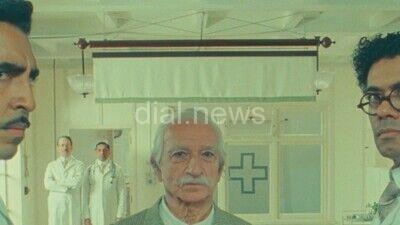It’s not animated—the actors are live-action and are a familiar and reliable bunch. Ralph Fiennes plays a version of Dahl; the movie opens in an Andersonian recreation of the writer’s real-life “writing hut,” where, after mumbling a list of what it takes to get him started on a story, Fiennes starts telling what purports to be a true one.
Dahl’s actual story, the action of which spans the globe, could conceivably be made into a very expensive multi-location movie. Anderson limits the action to a series of meticulous sets (of course they are) that, in this iteration, reminded me of the work of the fantastic Czech filmmaker Karel Zeman, who put live-action actors into animated backgrounds. All the actors address the camera directly, serving as narrators and characters. And they speak with little overt inflection (although quite a bit of subtle craft) at a very fast pace.
The words are almost all Dahl’s own, but Anderson has condensed the actual short story, which is fanciful though hardly child-aimed (although it’s not actively child-unfriendly, either). He understands he can’t improve on the dry wit of Dahl’s verbiage, so he doesn’t try. Describing the mega-rich title character, Dahl notes, “Men like Henry Sugar are to be found drifting like seaweed all over the world. They can be seen especially in London, New York, Paris, Nassau, Montego Bay, Cannes, and San Tropez. They are not particularly bad men, but they are not good men either. They are of no particular importance; they’re simply part of the decoration.”
The story is a meta-narrative (unless, of course, you choose to believe Dahl’s assertion that it’s true) that takes off when Henry (Benedict Cumberbatch, utterly perfect), bored, goes to the drastic extreme of taking a book off of a rich friend’s library shelf. The slimmest volume he sees, of course. It turns out to be a sort of dissertation about a man who can see without his eyes. The man in question is played by Ben Kingsley, and the doctors who confirm his power are Dev Patel and Richard Ayoade. The thing that catches Henry’s attention is this man’s ability to see through downturned playing cards. Henry is a gambler and not a particularly skilled one. Henry teaches himself how to see without eyes using a study method originated by a cranky yogi and absenting himself from society for several years due to his devotion/obsession.

